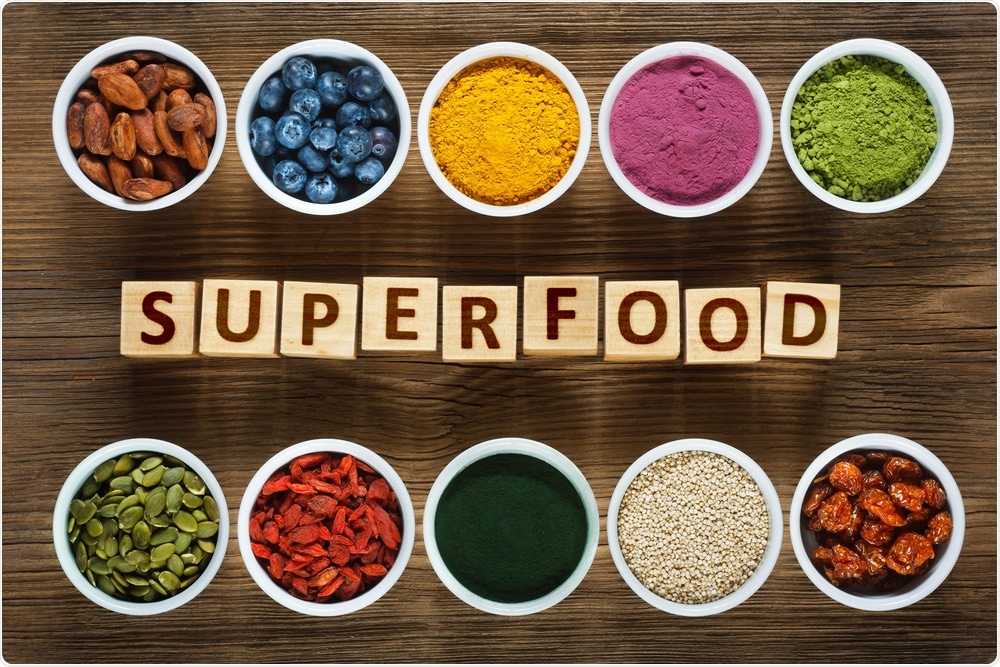Several groups of researchers from different universities across the United States will be presenting their findings at the NUTRITION 2021 LIVE ONLINE virtual conference on the science behind the health benefits of certain superfoods.
Despite the widespread use of the term ‘superfoods,’ there is no clear definition for what exactly a superfood is. Typically, food products that are labeled as superfoods will allegedly offer multiple health benefits to consumers and/or help in disease prevention.
Although the general consensus is that most products labeled as superfoods are over-hyped, certain foods offer immense health benefits. Most types of berries, for example, are high in dietary fiber, antioxidants, and other disease-fighting nutrients, thus supporting the description of these fruits as superfoods. Similarly, green leafy vegetables like spinach and collard greens are often high in dietary fiber, calcium, bioactive phytochemicals, and both vitamins A and C.

Superfoods. Image Credit: Evan Lorne/Shutterstock.com
Highlighting the health benefits of superfoods
Some of the specific superfoods that will be discussed at the NUTRITION 2021 LIVE ONLINE virtual conference include mangos, honey, as well as a variety of herbs and spices.
Mangos
Like many other types of fruits, mangos are also rich in vitamins, minerals, and fiber, as well as a variety of unique micronutrients. A group of researchers from the San Diego State University studied the difference between the daily consumption of 100 calories of fresh mangos as compared to 100 calories of low-fat cookies eaten each day. The study participants included 27 overweight and obese adults for a total duration of 12 weeks.
When compared to those who ate cookies each day, the individuals who consumed 100 calories of fresh mangos each day exhibited improvements in certain chronic disease risk factors. Although the cholesterol levels and bodyweight of the mango-only group were not affected by this snack choice, their fasting glucose levels and inflammatory markers were improved.
Taken together, the findings of this study indicate that the daily consumption of mangos, when compared to low-fat cookies, could improve certain risk factors that are associated with being overweight or obese.
Honey
Although honey has been used for medicinal purposes for several thousands of years, scientists are still trying to understand the biochemistry that is behind honey’s healthy properties. To this end, a group of researchers at the University of Nebraska-Lincoln identified nano-sized particles present within honey samples that exhibited a membrane-enclosed structure similar to that which is seen in exosomes of the human body.
Further experiments conducted on these exosome-like nanoparticles found that they successfully reduced inflammation in mice with experimentally induced liver injury.
Herbs and spices
A collaborative effort between researchers at the Penn State University and Texas Tech University involved examining the cardiometabolic effects of different herbs and spices when added to the average American diet.
The 71 test subjects included in this study were all at a higher risk of cardiometabolic diseases. These study participants were split into three groups, each of which consumed distinct diets including 6.6, 3.3, and 0.5 grams of added herbs/spices for a total of four weeks. Although there was not a significant difference in the cholesterol or blood sugar levels between the participants of each diet group, the researchers found that those who consumed the greater amount of spices, which was equivalent to about 1.5 teaspoons a day, exhibited improved blood pressure levels as compared to those who consumed the lower amounts of herbs and spices.
Another group of researchers from Clemson University also looked at how a distinct group of spices including ginger, cinnamon, and turmeric might have an impact on reducing specific health conditions like diabetes and cardiovascular diseases. To this end, the researchers analyzed a total of 28 studies that included 1,049 control patients and 1,035 patients who ingested these spices in capsule form for one to three months.
The study participants with type 2 diabetes who consumed ginger, cinnamon, turmeric, curcumin, and curcuminoids were found to exhibit improved lipid profiles. While the data from these studies are limited, these findings suggest that spices like ginger, cinnamon, and turmeric may provide a health benefit for individuals with type 2 diabetes, as well as those with high cholesterol levels.
Sources:
Journal reference: